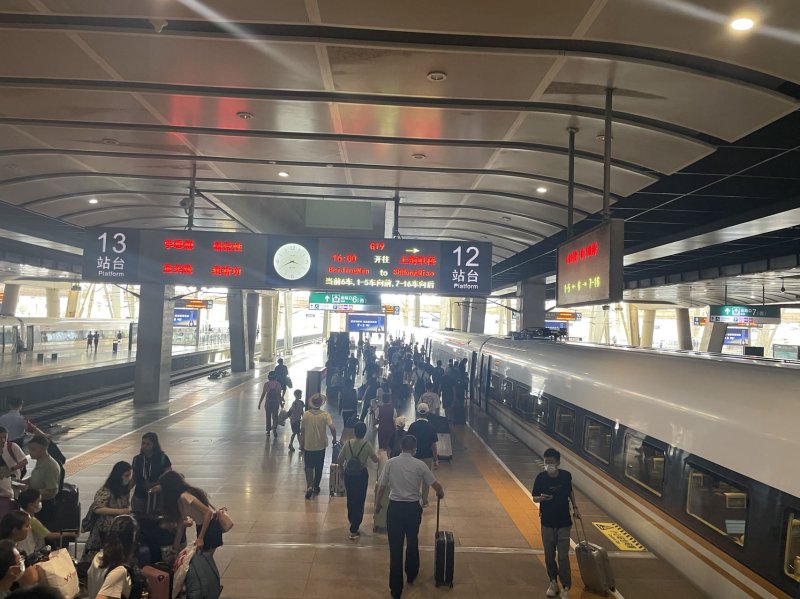Beijing-Shanghai Rail Trips Are Outpacing Flights, Here's Why
The high-speed rail route between Beijing and Shanghai has recorded an impressive profit of RMB 5.1 billion in the first half of 2023, the surge in earnings surpasses the combined profit of five leading Chinese airlines, according to a recent report from Yicai Global. This points to a trend that sees more and more travelers in China choosing high-speed rail over flying. So, what's driving the change?
Price
When it comes to choosing a mode of travel, the price factor often takes the front seat for most people. And in this battle of affordability, the high-speed train usually comes out on top. A quick online search will show you that a second-class seat on a high-speed train, or gaotie, from Beijing to Shanghai costs anywhere between RMB 553 and RMB 667. The best part? That price typically stays consistent.

Air travel, on the other hand, is a different story. Airfare tends to swing with the seasons and the demand. Here's an interesting stat: citing the China Air Transport Association, Yicai Global says the average cost of an air ticket in China rocketed up by 30.6 percent in the first quarter of 2023, compared to the same period in the previous year. That's a significant 13.6 percent increase from the same quarter in 2019.
Let's put this into perspective. If you were to look up flight tickets from Beijing to Shanghai right now, you'd find that prices usually hover between RMB 780 and RMB 1,000. And remember, that doesn't even include the fuel charge, which can rack up an extra RMB 160 per trip. Considering that you'd essentially be paying around the same amount for a round trip by high-speed train as you would for a one-way flight, it's fair to say high-speed rail fairs generally offer more bang for your buck when compared to flights.

Travel Time
Travel time is another critical aspect that travelers must consider when planning their journeys. While a 2.5 hour flight from Beijing to Shanghai seems better on paper than the 4.5 hour train ride, this ignores the hidden details. Once you factor in baggage check and security wait times at airports, plus the commute time from the railway station and airport to the city center, things start to add up.
To many, Beijing South Railway Station, nestled within the 2nd Ring Road, is a more accessible option than the Beijing Capital International Airport or Beijing Daxing Airport. It's closer to the city center, and with Subway Line 4, you can reach Tian'anmen Square from the station within half an hour.

A local Beijinger shared their perspective, "For me, if I choose to fly from Beijing Capital Airport, I'd have to leave at least 2.5 hours before the flight's departure time. However, taking the high-speed train, or gaotie, is a different story. From my home, the journey to Beijing South Railway Station, where I can catch the gaotie, is a mere 40-minute ride. Plus, with Subway Line 4 providing a direct connection, I only need to leave an hour and a half before my train departs, which saves me a considerable amount of time."
The individual further added, "Plus, the time spent on security checks at the airport is significantly longer than at the high-speed train station. That's an additional chunk of time I need to account for."
Punctuality
Another reason to choose high-speed rail is its punctuality, a feature that is not as susceptible to weather conditions. This stands in stark contrast to the unpredictable delays often associated with air travel. Michael, a Beijing resident and frequent business traveler between Beijing and Shanghai, had this to say: "The flight corridor between Shanghai and Beijing is notorious for its delays. Yet, even in the absence of delays, the train emerges superior -- it's faster, more affordable, and infinitely more comfortable."

To further illustrate this point, it's worth noting that several Chinese airports, including Beijing Capital International Airport and Shanghai Hongqiao International Airport, feature prominently on the list of the world’s 100 busiest airports with the longest delays. With flight delays averaging around 43 minutes, it's clear to see why many Beijingers may prefer the reliability of the high-speed train over air travel.
A more satisfying trip
Moreover, the majority of Beijingers relish a more gratifying journey when opting for the high-speed train over a flight. They share, "My preference always leans towards the gaotie. It affords more legroom than an economy-class seat on a flight, and a notable bonus is the unrestricted use of electronic devices and internet throughout the entire journey."

So, there you have it: for a lesser price, you get a voyage that, once you factor in commute time and check-in procedures, is almost on par time-wise with a flight. Add to that a more relaxed and comfortable experience, and it becomes clear why travelers are less inclined to fly for medium distances, choosing the train instead.
So, my dear Beijingers, which transport mode tops your list for a Beijing-to-Shanghai journey? Is it the punctual and economical gaotie or the potentially quicker, but more unpredictable flight? Let us know in the poll!
READ: Nanluo Eateries Required to Move Food Sales, Dining Indoors From Sep 1
Images: Unsplash, Irene Li, Canva








